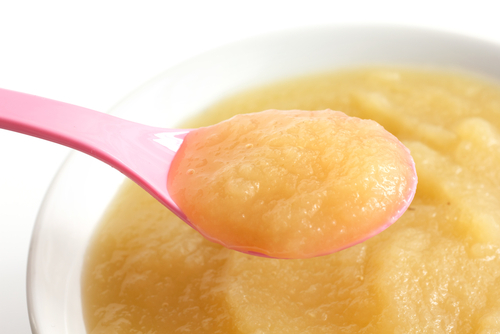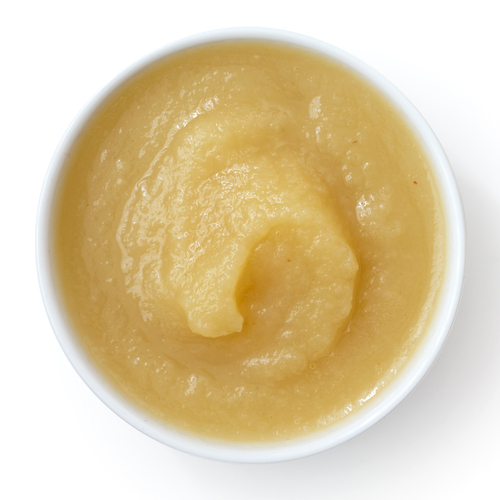Is Applesauce Bad For You?
Short answer
Applesauce is a wonderful snack that is high in fiber, vitamins, minerals and phytonutrients. Avoid applesauce that has high fructose corn syrup or any additional chemical additives. The best choice is to make your own or purchase organic applesauce made with the skins of the apples.
Recommended Alternative
Very healthy and numerous health benefits. A few harmful qualities may be associated, but only under certain circumstances such as an allergic reaction.
View Full Grading System
Category 'A'
Very healthy and numerous health benefits. Side effects are rare. Things rated an 'A+' are typically necessary for survival (for example, water).
Very healthy and numerous health benefits. A few harmful qualities may be associated, but only under certain circumstances such as an allergic reaction.
Very healthy and numerous health benefits. Harmful qualities may be associated, but aren't usually serious.
It is important to note that even the best things in life can become bad in immoderate amounts. So, although something may be rated an 'A+', overconsumption/overdoing can bring unwanted effects.
Category 'B'
Very beneficial to your health. Things rated a 'B+' may have a few harmful qualities to pay attention to.
Overall beneficial to your health. Things rated a 'B' may have some harmful qualities to pay attention to.
More beneficial to your health than not. However, harmful qualities are most likely associated and shouldn't be overlooked.
The main difference between category 'A' and category 'B' is the harmful qualities typically present in 'B' items. Serious side effects are usually uncommon, but are still possible and should be taken note of.
Category 'C'
Both beneficial and harmful qualities associated. Things rated a 'C+' are typically a bit more on the beneficial side. Still, moderation is important.
A fairly even ratio of beneficial and harmful qualities. Moderation is important. Very general topics that can lean towards both sides of the spectrum will be placed here as well. Rice, for example, can be good or bad depending on the type.
More harmful than beneficial. Side effects are common, especially when consumed/done excessively. Moderation is very important.
Category 'C' usually denotes to both good and bad qualities. When it comes to this category, it is important to keep this word in mind: moderation.
Category 'D'
Harmful to your health. Although benefits may be associated, the bad most likely outweighs the good. Moderation is very important.
Harmful to your health. A few benefits may be associated, but the bad outweighs the good. Moderation is extremely important.
Harmful to your health. Very few, if any, benefits are present. Things in this category should be avoided as much as possible.
Category 'D' is typically for things that are more harmful than beneficial. While consuming/doing something unhealthy once in a blue moon shouldn't hurt, we definitely recommend eliminating 'D' items as a regular part of your routine/diet.
Category 'F'
Category 'F' is for things that fail to bring anything beneficial to the table, and are very harmful to your health. We recommend completely avoiding anything in this category. Long-term side effects of 'F' items are usually very serious.
Category 'N'
'N' stands for neutral. Things placed into this category are generally (a) neither good nor bad for you, or (b) lack the necessary evidence to reach any conclusions.
Long answer
Apples are nutrient dense fruits that when made into a ground sauce will satisfy most palates and supply a nice source of vitamins, minerals, flavanoids, dietary fiber and antioxidant power to the body. Applesauce is a great source of Vitamin C and also provides Vitamin K, B6, riboflavin, potassium, copper, manganese and magnesium. The skin of the apple should be used to make the sauce in order to capture higher amounts of fiber. Fiber is a missing nutrient in many diets so boosting your daily intake will support healthy digestion and elimination. Fiber is filling and also supports healthy glucose and cholesterol levels.
Homemade applesauce made with whole organic apples and no added sugar is a great snack or addition to any meal. Some added cinnamon can give additional health benefits. The antioxidant effects offer cellular stability against DNA disruptive free radicals and some research studies demonstrate that apples can prevent lung cancer and slow down the growth of breast tumors. Applesauce has been studied in reference to metabolic syndrome (visceral fat that is linked to Type 2 Diabetes, high cholesterol, high blood pressure and increased cardiovascular risk) demonstrating that the nutrients in apples lower the risk of this deadly syndrome. Eating an apple or applesauce daily has also been linked with decreased risks of asthma and enhanced lung function.
The pectin in apples suppresses your appetite, making apples or applesauce helpful in a weight loss program and the flavanoid quercetin is a natural anti-inflammatory that helps with various arthritic and systemic inflammatory conditions.
Unfortunately, genetically modified (GMO) apples were due to be released early 2017. Buy organic apples if you are making your own applesauce recipe. If you are purchasing applesauce that is pre-made then avoid plastic containers (possible BPA’s), still look for an organic option and find a brand that does not have high fructose corn syrup, added sugars, food coloring, etc.
Possible long-term side effects
- too many apples equals high calories/carbohydrates and can inhibit weight loss
Ingredients to be aware of
Benefits
- great source of vitamin c and also provides vitamin k, b6, riboflavin, potassium, copper, manganese and magnesium
-
great antioxidant
-
high in fiber
-
heart healthy and helps with metabolic syndrome
-
supports the health of the gi tract
-
natural anti-inflammatory
-
brain support
Our Wellness Pick
(what is this?)
Organic Honeycrisp Apple Sauce
- USDA Organic Certified
- Non-GMO Project Verified
- No added sugar
- Convenient pack of 6
- Gluten-free product
Learn More!
Please turn your Ad Blocker off to see this content. Thank you!
Thank you for your feedback!
Written by Dr. Becky Maes
Published on: 01-11-2018
Last updated: 12-01-2023
Thank you for your feedback!
Written by Dr. Becky Maes
Published on: 01-11-2018
Last updated: 12-01-2023

 Approved by
Approved by 















